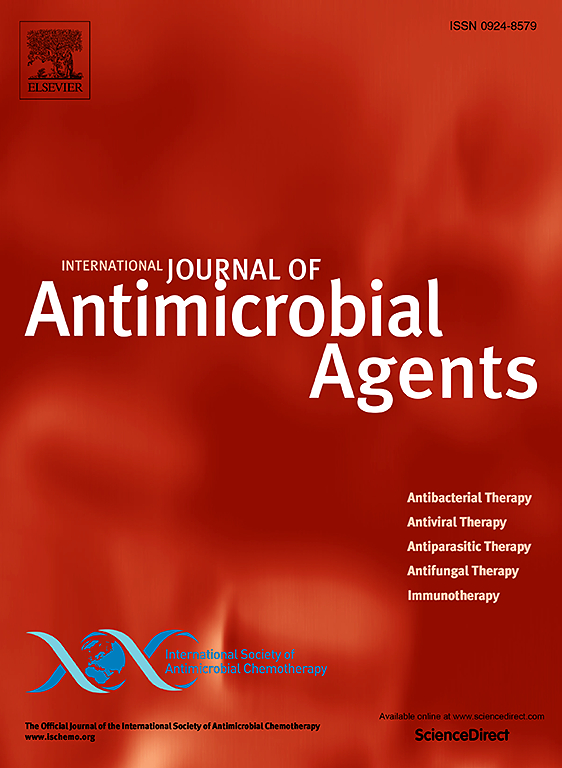Analysis of time-to-positivity data in tuberculosis treatment studies: Identifying a new limit of quantification
IF 4.9
2区 医学
Q1 INFECTIOUS DISEASES
International Journal of Antimicrobial Agents
Pub Date : 2025-02-01
DOI:10.1016/j.ijantimicag.2024.107404
引用次数: 0
Abstract
Background
The BACTEC Mycobacteria Growth Indicator Tube (MGIT) machine is the standard globally for detecting viable mycobacteria in patients’ sputum. Samples are observed for no longer than 42 days, at which point the sample is declared ‘negative’ for tuberculosis (TB). This time to detection of bacterial growth, referred to as time-to-positivity (TTP), is increasingly of interest, not solely as a diagnostic tool but also as a continuous biomarker wherein change in TTP can be used for comparing the bactericidal activity of different TB treatments. However, as a continuous measure, there are oddities in the distribution of TTP values observed, particularly at higher values.
Methods
We explored whether there is evidence to suggest setting an upper limit of quantification for modeling purposes (ULOQM) lower than the diagnostic limit of detection (LOD) using data from several TB-PACTS randomized clinical trials and PanACEA MAMS-TB.
Results
Across all trials, less than 7.1% of weekly samples returned TTP measurements between 25 and 42 days. Further, the relative absolute prediction error (%) was highest in this range. When modelling with ULOQMs of 25 and 30 days, estimator precision improved for 23 of 25 regimen-level slopes compared to models using the LOD. Discrimination between regimens based on Bayesian posteriors also improved.
Conclusions
Although TTP measurements between 25 days and the diagnostic LOD may be important for diagnostic purposes, TTP values in this range may not contribute meaningfully to its use as a quantitative measure, particularly when assessing treatment response, and may lead to underpowered clinical trials.
结核病治疗研究中阳性时间数据的分析:确定量化的新限制。
背景:BACTEC分枝杆菌生长指示管(MGIT)是检测患者痰中活菌的全球标准。对样本的观察时间不超过42天,此时该样本被宣布为结核“阴性”。这种检测细菌生长的时间,即TTP,不仅作为一种诊断工具,而且作为一种连续的生物标志物,TTP的变化可用于比较不同结核病治疗的杀菌活性,越来越受到人们的关注。然而,作为一个连续测量,在TTP值的分布中有一些奇怪的现象,特别是在较高的值。方法:我们利用几项TB-PACTS随机临床试验和PanACEA MAMS-TB的数据,探讨是否有证据表明设定定量建模上限(ULOQM)低于诊断检测限(LOD)。结果:在所有试验中,不到7.1%的每周样本在25至42天之间返回TTP测量值。在此范围内,相对绝对预测误差(%)最高。当使用25天和30天的uloqm进行建模时,与使用LOD的模型相比,25个方案水平斜坡中的23个估计器的精度得到了提高。基于贝叶斯后验的方案之间的区分也有所改善。结论:虽然25天和诊断LOD之间的TTP测量对于诊断目的可能很重要,但该范围内的TTP值可能对其作为定量测量的使用没有意义,特别是在评估治疗反应时,并且可能导致临床试验的有效性不足。
本文章由计算机程序翻译,如有差异,请以英文原文为准。
求助全文
约1分钟内获得全文
求助全文
来源期刊
CiteScore
21.60
自引率
0.90%
发文量
176
审稿时长
36 days
期刊介绍:
The International Journal of Antimicrobial Agents is a peer-reviewed publication offering comprehensive and current reference information on the physical, pharmacological, in vitro, and clinical properties of individual antimicrobial agents, covering antiviral, antiparasitic, antibacterial, and antifungal agents. The journal not only communicates new trends and developments through authoritative review articles but also addresses the critical issue of antimicrobial resistance, both in hospital and community settings. Published content includes solicited reviews by leading experts and high-quality original research papers in the specified fields.

 求助内容:
求助内容: 应助结果提醒方式:
应助结果提醒方式:


